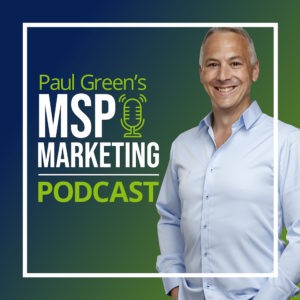
The podcast powered by the MSP Marketing Edge
Welcome to this week’s episode of the MSP Marketing Podcast with me, Paul Green. This is THE show if you want to grow your MSP.
In this episode I encourage you to assess your prospects to ensure they are the right fit for your MSP. Assess their value appreciation, willingness to follow advice and pay fairly, dependence on technology, and timely payment habits. (jump to)
I also explain why effectively converting leads into loyal clients requires persistent follow-up, strategic long-term engagement, and thoughtful touches. Follow up until they buy, die, or say bye-bye. (jump to)
I’m joined by Damien Harrison, Director of Operations at Bondgate IT. We discuss how hiring an operations director and prioritising relationship-building over immediate sales can significantly elevate your MSP’s growth and client satisfaction. (jump to)
Lastly, I answer a question from Alex who runs an MSP in Georgia. He wants to know how to maintain client trust and growth when outsourcing his MSP’s help desk overseas. (jump to)
Join me as we unpack these topics and learn from some triumphs and trials in the MSP world. Oh, and don’t forget to join me in the MSP Marketing Facebook group.
You sure that prospect’s a great fit for your MSP?

Turning a lead into a prospect is exciting, but how do you know if they’re truly a great fit for your MSP? Here are five ways to measure their potential:
Value Appreciation: top prospects understand the value of your services. They see you as an investment in their business, not just a fixer of problems. They know you’re essential for their growth.
Willingness to Follow Advice: good clients follow your strategic advice. If they see your value, they’ll be more inclined to trust and implement your recommendations.
Willingness to Pay: quality clients are happy to pay a fair price for your services. They understand that good service costs money and they don’t haggle. This reflects their understanding of the value you provide.
Dependence on Technology: ideal clients rely heavily on technology. They recognise it as a growth lever and are willing to invest in IT to enhance their business.
Timely Payments: reliable clients pay their bills on time. This shows respect for your services and a commitment to maintaining a strong relationship.
Assess prospects using these criteria to ensure a strong, productive partnership.
A new lead has tons of value until one of these 3 things happens

Lead generation can be challenging for MSPs, but treating leads as disposable is a mistake. Understanding the journey from suspects to leads, then prospects, opportunities, and finally, clients, helps tailor your approach.
Follow-up. Follow-up. Follow up. A robust sales system ensures you reconnect, especially when prospects aren’t ready immediately. Long-term engagement ensures leads don’t expire quickly. Persistence pays off, sometimes after many years. Follow up until they buy, die, or say bye-bye.
Use LinkedIn to connect and engage regularly by posting content, commenting on their posts, and sharing relevant information. Add leads to your email and snail mail lists – send weekly educational emails and monthly newsletters. Call biannually, run targeted marketing campaigns, host events, and remember to send unique touches like Christmas cards in March.
By embedding these strategies into your MSP, you ensure that no lead is wasted, transforming potential clients into loyal, long-term partners. Remember, persistence and thoughtful engagement are key to converting leads.
Removing your worries about hiring an operations person, to free up your personal time

Running an MSP is a juggling act – balancing business growth, client satisfaction, and employee retention. Once you surpass a handful of staff, consider hiring an operations director to handle daily details, freeing you to focus on strategic growth.
Damien Harrison, Director of Operations at Bondgate IT, highlights the crucial role of operations directors in MSPs. An operations director manages the customer journey from sales to support, ensuring seamless transitions and high-quality service. This role allows the business leader to concentrate on strategic objectives and enjoy more personal time.
Damien also stressed the importance of nurturing relationships before selling. Many MSPs make the mistake of rushing to close deals without building trust. He suggests attending networking events consistently, engaging with prospects, and valuing personal interactions over digital ones.
To sum up, integrating an operations director can elevate your business, and prioritising relationship-building over immediate sales can lead to long-term success.
FEATURED GUEST:

Damien Harrison is a seasoned IT professional with over two decades of experience in the industry. As the Director of Operations and overseer of the Technical Support team at Bondgate IT, Damien is known for his strategic vision and hands-on approach.
He has a rich background working in the public sector and as Head of IT for a major third sector charity. His expertise lies in ensuring compliance, enhancing client satisfaction, and fulfilling unique support requirements.
Damien’s leadership style is characterised by his commitment to fostering innovation, maintaining robust cybersecurity, and building resilient IT infrastructures. Passionate about continuous improvement and community engagement, Damien is dedicated to helping organisations navigate the complexities of modern IT landscapes.
Connect with Damien on LinkedIn
How do I tell my clients we’re outsourcing the helpdesk overseas?
This week we have a combined marketing and business growth question from Alex who runs an MSP in Georgia. He is concerned about the impact on his client relationships when he outsources the help desk overseas.
When outsourcing your MSP’s help desk overseas, it’s crucial to handle client communications thoughtfully to maintain trust and growth potential. Here are three strategies:
Selective Disclosure: if you’re only outsourcing ticket handling and live chat, while keeping phone support local, you might opt not to inform clients. This minimises potential concerns as most clients won’t notice the change.
New Client Transparency: be upfront with new clients about your outsourcing from the start. This sets clear expectations and avoids any surprises, maintaining trust from the outset.
Use Analogies: explain outsourcing with relatable comparisons. For instance, liken it to a car mechanic. Just as a master mechanic focuses on complex repairs rather than routine tasks like spark plug changes, your skilled technicians are freed up for crucial work by outsourcing basic help desk tasks. This approach highlights efficiency and dedication to quality service, reassuring clients about the benefits of your decision.
Got a question about your MSP’s marketing? Submit one here for Paul’s Personal Peer Group.
